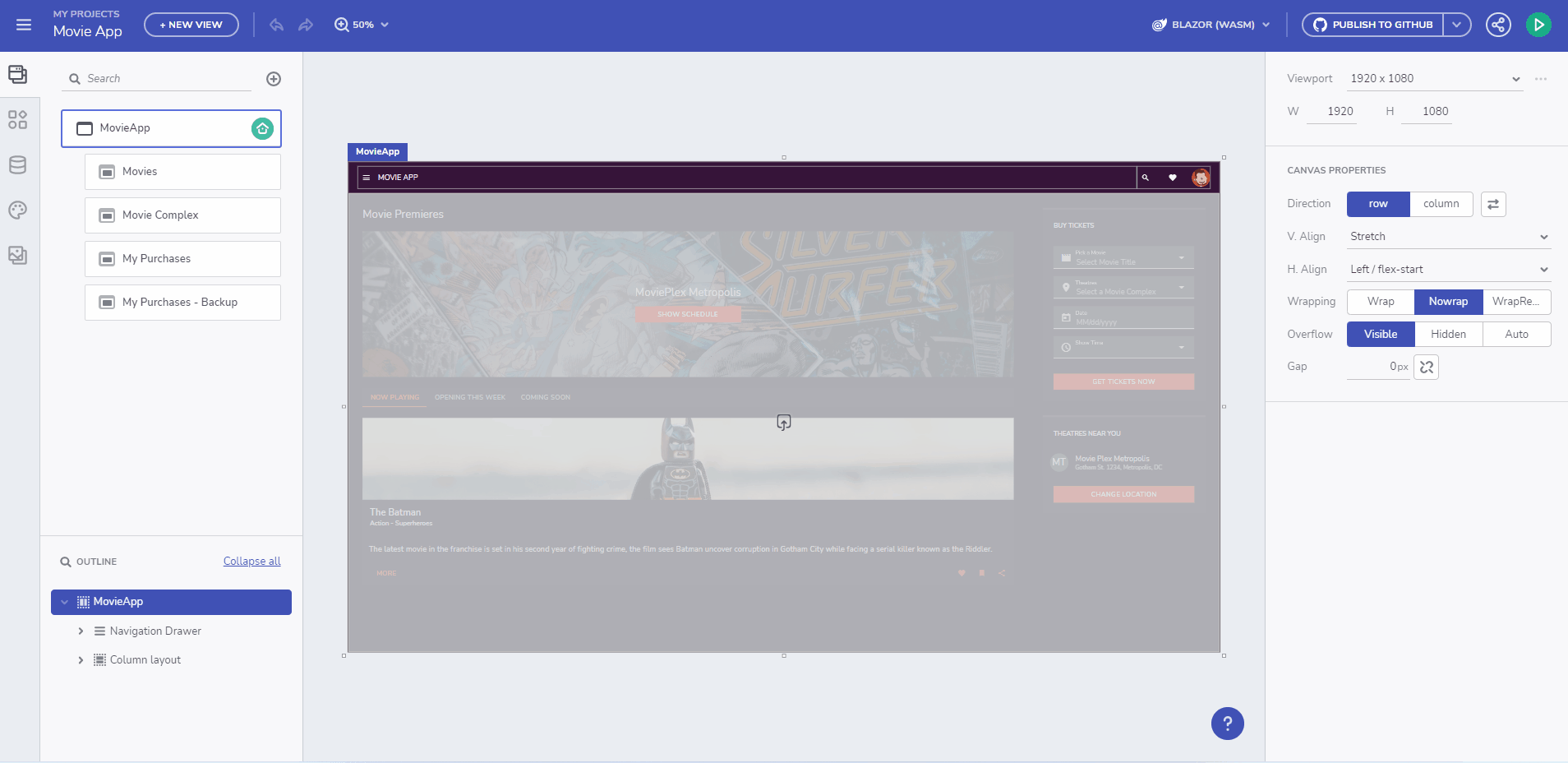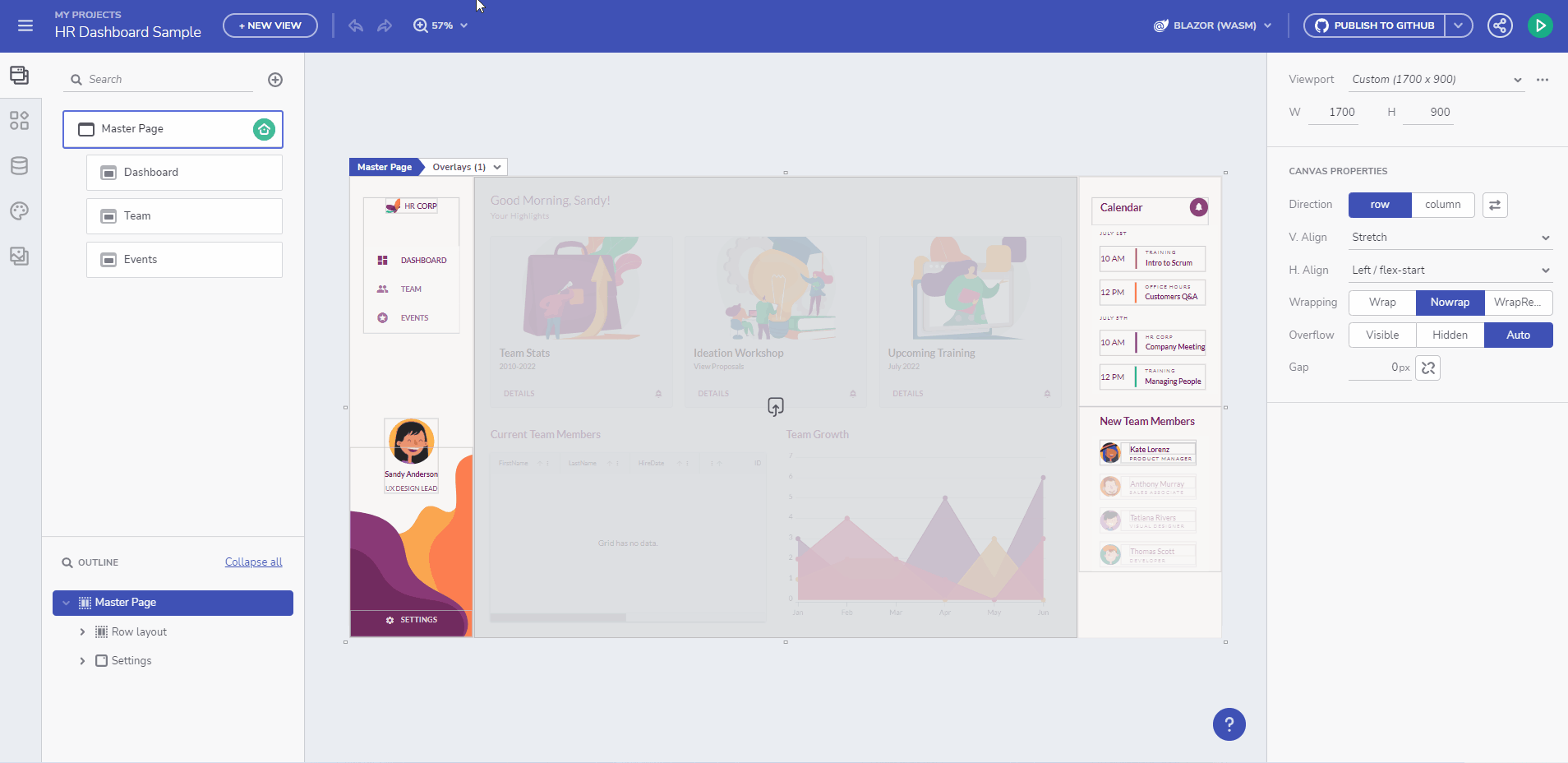
3 Angular App Examples You Can Use Right Away
Sometimes you don’t have to start an Angular project from scratch. You can use a sample application and make it your own with additional customizations. This article provides a few examples to get you started.
Angular offers flexibility in coding like no other framework because of its speed, performance, effective cross-platform development, simple design architecture, and more. But suppose you’re just getting started with the framework. In that case, you may encounter challenges like a steep learning curve, multiple configuration files and commands to set up a new project, adapting to its syntax and features, and more. If you want to speed up the app development process and inspire yourself for the next project, you can always use a customizable Angular app example. Combine this with a low-code tool and an actual UI component library, and the entire design-to-code cycle is streamlined like never before.
Let’s look at 3 Angular samples we built with our WYSIWYG App Builder.
Why Kickstart Your Project Using An Angular App Example
Starting an Angular project with a customizable sample app, UI controls, and low code becomes a way to achieve pivot change for optimized design-development processes and faster time-to-market.
Now, low-code development platforms are gaining tremendous popularity because they work as a quick and easy solution for developing modern-day applications with minimal coding effort. While most of them may not be the go-to choice when building a too complex and highly customized Angular app, more comprehensive tools like App Builder evolve fast enough to offer numerous advantages, making it suitable for various use cases.
And yes, it is super easy to design and modify the apps’ UI using visual tools and experimenting with different layouts, real UI component library integration, and features. But the design-to-code process can be even more simplified if you start with a real-time Angular app example and use it immediately. How exactly?
It provides a head start
You can save time and effort in the initial setup phase by leveraging the best-of-breed Angular components, ready-to-use templates, and functionalities already provided by the app. Instead of starting it all from scratch, you get a good starting point for the initial setup phase that can be more easily extended afterward. Plus, you have more time to focus on customizing and enhancing the app rather than investing in setting up basic components and functionalities.
It’s a hands-on experience
Some of the best app development practices are right there in the ready-to-use Angular application. In addition, it usually adheres to industry standards. If you’re new to Angular, you can use this to gain sufficient insights as to learning and understanding things like architectural patterns, Angular-specific syntax, design possibilities, concepts that you can apply later on when you develop a completely new project, the ways components interact, how to implement standard features, and so forth.
It eliminates common development tasks
Reusability and abstracting away many common tasks like creating UI layouts, integrating controls, or data binding are key to maintaining consistency and quality. And with all of this modular app development already implemented in the sample app, you can have it all, plus achieve time-efficient and cost-effective development.
It is easy to modify and customize
With a sample app as a starting point, you benefit from flexibility that lets you adjust the existing components, UI templates, and logic so they match your app requirements and branding. With a set of interactive features in place, the Angular app can be tailored to different usage scenarios based on your organization’s unique needs.
It is agile, scalable, and easy to maintain
By leveraging the structure and architecture of the Angular example app, you can build upon a proven framework that facilitates future enhancements, updates, and maintenance. In addition, you can use the This way, you can minimize development time and maximize the app capabilities in no time.
There’s the real-time preview
The sample apps built with the low-code App Builder can provide instant feedback, allowing you to see the changes you make to the app in real time. With the code preview option, you can inspect the underlying code instantly, understanding how specific features or components are implemented. Moreover, it allows extracting and reusing specific code snippets for other purposes and projects.
Top 3 Angular App Examples Built With Low Code for a Rapid Start
All Angular app examples are built in the App Builder, meaning they are framework-agnostic. You can easily switch between the supported frameworks (Angular, Blazor, Web Components) and generate code.
LEARNING PORTAL APP
This is an example of a learning management app allowing users to track progress on courses based on popular topics or instructors. The project features custom lists bound to REST and adaptive layouts. The Angular components used for making this application include: Accordion, Avatar, Card, Checkbox, Chip, Icon, List, Rating.
Check out the learning portal app preview and inspect the code.
MOVIE APP

This is an example of a movie theater booking application. We’ve used a custom drop-down menu with different data filtering options to let users select their movie preferences from a pre-set list. The pop-up Calendar, Date Picker, and the Select component provide a quick and easy way to select the preferred date. Other components used: Navigation Drawer, Icon, Icon Button, Avatar, Tab Layout, Card.
Check out the movie app preview and inspect the code.
HR DASHBOARD APP

The HR dashboard sample demonstrates how various Ignite UI controls work along with App Builder to create a comprehensive view suitable for multiple devices. The purpose of this app is to assist team leads and managers in handling events, managing team members, and previewing personal information about team members – name, role-specific information, telephone number, and more. We used the Ignite UI for Angular Avatar component to make it more visually appealing, adding images for each person. The Category Chart visualizes statistics and trends like team growth. Other Angular components used for the HR dashboard app: Icon Button, Icon, List, Card, Data Grid.
Check out the HR dashboard app preview and inspect the code.
A Dev Tip:
No matter the benefits and the quick start, it’s essential to always carefully evaluate the quality, reliability, and extensibility of the sample app you’re using for your Angular project. Make sure it complies with your project’s requirements and long-term goals. You can also take advantage of our full-featured Angular component library and fetch the best-in-class widgets in your scalable project, especially when you decide to build an Angular app from scratch.
In Conclusion
Starting an Angular project with sample apps speeds up the entire development process as it offers a solid foundation that you can further develop, extend, and customize. As it becomes such a practical approach to app building, especially for Angular newcomers, it can help you learn fundamental Angular concepts, explore best practices, get inspired by UI designs, and enhance your existing Angular skills much faster.

